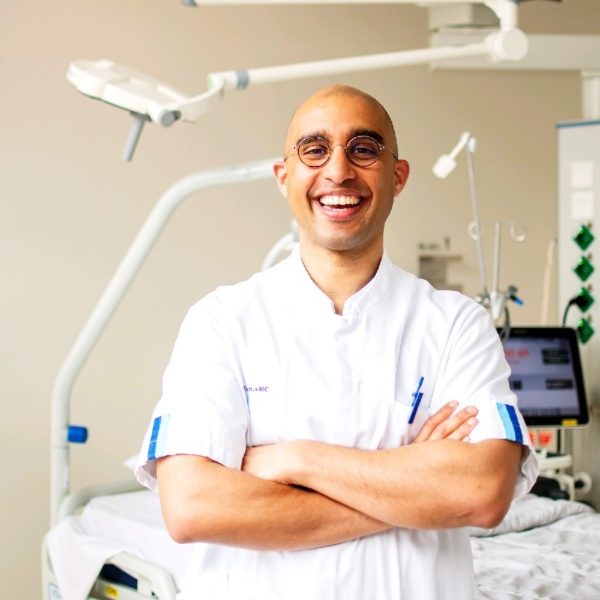Artificial intelligence (AI) is revolutionizing the way medical professionals deliver care and manage patient data.
By harnessing the power of advanced algorithms and machine learning, AI applications contribute to more accurate diagnostics, personalized treatment plans and streamlined administrative processes. The integration of AI into health care is helping create a paradigm shift in the industry toward a more data-driven and patient-centric approach.

Erasmus University Medical Center, the leading university medical center in the Netherlands, is embracing the power of data and AI for improved patient care. Partnered with SAS and Microsoft, Erasmus is implementing data-driven applications across the hospital, preventing complications and optimizing the use of operating rooms, intensive care units and beds.
Dr. Michel van Genderen, Internist-Intensivist at the Erasmus MC, is helping bring together disciplines from across the hospital to collaborate on AI model development, provide technical support for implementation and help with data innovation and ethical issues. In this Q&A, he discusses how Erasmus MC uses AI to improve patient care and increase productivity.
What does trustworthy AI mean to you?
Dr. van Genderen: Trustworthy AI means that we have AI that is safe and explainable. In the end, the AI model does not harm patients. In order to facilitate that we must move away from the ‘black-box’ AI models and must shift to explainable AI throughout the AI lifecycle. An important facet of this process is to test data and models on bias before implementing them for clinical use. Trustworthy AI improves the quality of life and quality of care for everyone – for every human being, for every patient.
Can you share an example of how Erasmus MC is using AI?
Dr. van Genderen: One example is the decubitus model (an AI algorithm) we produced to predict pressure ulcers in the intensive care unit. We use the model to reduce the nurses’ workload. On the one hand, the model improves the quality of care because we can predict patients who are at increased risk of getting pressure ulcers. And on the other hand, we have lowered the administration rate for the nurses because we automated the prediction.
By using analytics in such a way that we can understand the true value of the data, we can improve our quality of care, come up with better care solutions and work more efficiently.
– Dr. van Genderen
What do you see as future opportunities for AI transformation in health care?
Dr. van Genderen: Our health care system faces two critical challenges: a shortage of personnel and increased health care demand. The true test will be figuring out how to tackle these problems in such a way that you increase the quality of care for the next 10, 20 – maybe even the next 50 – years through investments in data and technology.
There have been many unforeseen disruptions over the past few years. What has Erasmus MC done to be more resilient in the face of disruption? And how have data and analytics played a role in that?
Dr. van Genderen: One example is the DataHub. That’s a physical place in the hospital where relevant stakeholders (patients and their families, data scientists, etc.) can come together to share knowledge, formalize our data approach, and ensure we are adding value using analytics and artificial intelligence in the clinics.
How are you using AI and data to improve productivity at Erasmus?
Dr. van Genderen: In our organization, we talk a lot about AI. It makes some health care professionals anxious. They are afraid AI will change their job – and it will. AI will make them more efficient by automating the tedious, frustrating administrative work that takes them away from patients. So that tackles your question about increasing productivity from a clinical perspective, but there is also a data perspective.
Trustworthy AI means that we have AI that is safe and explainable. In the end, the AI model does not harm patients.
– Dr. van Genderen
By using analytics in such a way that we can understand the true value of the data, we can improve our quality of care, come up with better care solutions and work more efficiently. So from a data perspective, Erasmus MC is working to make data and analytical insights more scalable and understandable for our health care professionals. AI will transform health care and ensure that we keep health care professionals in health care.
Health care transformation and innovation
Erasmus MC is helping to lead the way for AI transformation in health care. Providers around the world are also using AI to evaluate treatment options for cancer, identify high-risk populations and target interventions where they are needed, and predict patients most at risk of opioid abuse and prescription fraud.
In the future, AI is expected to become more adept at early disease detection and enable more personalized treatment plans with fewer side effects. It will streamline drug discovery and development and provide earlier predictions of disease outbreaks, patient admission rates and other important health care trends.
As more health care professionals put AI to work, we are beginning to see impressive advancements in health care – personalized medicine, efficient administration, and enhanced patient care and outcomes – while also addressing challenges such as cost, access and efficiency.


